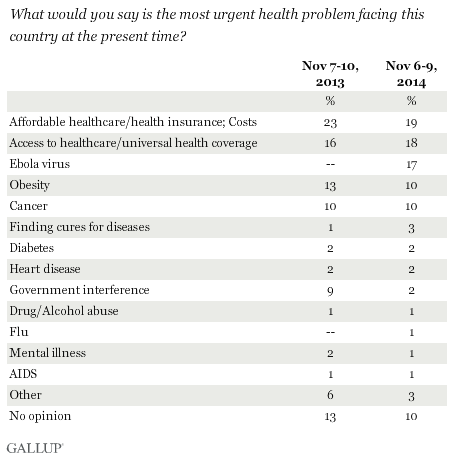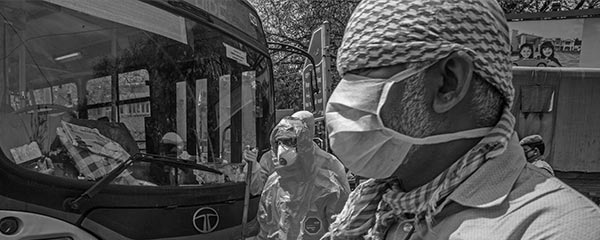Story Highlights
- About one in six name Ebola as nation's top health problem
- Issue roughly matches concerns about healthcare costs, access
- Cancer and obesity remain prominent secondary concerns
PRINCETON, N.J. -- Healthcare costs (19%) and access (18%) continue to rank among the leading issues Americans cite when asked what they consider to be the country's "most urgent health problem." But Ebola, mentioned by 17%, now joins these perennial concerns as one of Americans' top health worries.

Obesity and cancer are the only other issues garnering double-digit percentages of mentions this year, each cited by 10%. Other specific diseases or health problems -- including diabetes, heart disease, drug and alcohol abuse, flu, mental illness and AIDS -- receive minimal mentions of 1% or 2%.
Gallup has measured public perceptions of the leading U.S. health problem annually since 1999, and, prior to that, periodically starting in 1987. This year's results are based on Gallup's annual Health and Healthcare survey, conducted Nov. 6-9.
At the time of the new survey, only one of the four people who had been diagnosed with Ebola in the U.S. was still being treated, and the other two surviving patients had already been declared virus-free. Several U.S. healthcare workers who were infected abroad and flown to the U.S. for treatment had also recovered by the time of the survey, while the outbreak in West Africa seemed to be slowing. Thus, it is a testament to the gravity of the Ebola virus that it still sparks relatively high public concern several weeks after the peak of the U.S. scare.
Similar percentages of men and women, as well as younger versus older Americans, consider Ebola the nation's top health concern right now. But this view does differ by level of education. Twenty-two percent of adults who never attended college, as well as 19% of those with some college experience, name Ebola as the top problem, compared with 11% of those with least a four-year college degree.
Ebola Joins Flu, Bioterrorism and AIDS as National Health Scares
Gallup's long-term trend documents a handful of episodic health concerns over the years, where the issue spiked as a public concern one year, only to disappear the next. The flu has twice captured public attention when specific flu strains attracted widespread publicity, including with the bird flu scare in 2005 and the H1N1 virus in 2009. Bioterrorism was the top-ranking concern in 2001, mentioned by 22% of Americans as the nation was riveted by an ongoing anthrax attack, but it fell to 1% the next year.
AIDS stands apart, as a concern that dominated the health landscape for a number of years, until it subsided, partly due to progress in the control and treatment of the illness. AIDS registered 68% concern in Gallup's inaugural asking and continued to dominate the list through the 1990s. However, it dwindled as a public concern after 2000, and is now hardly mentioned.
These issues contrast with cancer, which has rarely been a top-ranking issue, but has consistently appeared in the top three or four health problems in Americans' minds, almost always registering at least 10%, and reaching a high of 23% in 1999. Obesity has emerged as a steady concern in recent years, including 16% mentioning it in 2012 after it gradually rose from 1% in 1999.
Bottom Line
Ebola may not be the dominant news story it was a month ago, but it is still on the minds of Americans, 17% of whom cite it when asked to name the top health problem facing the U.S. Still, Gallup's history of asking this question strongly suggests that without continued incidents of Americans catching the virus on U.S. soil, this flare of concern will be temporary.
Meanwhile, a year after the Affordable Care Act began to offer all Americans healthcare through government healthcare exchanges, with discounts given to some based on financial need, nearly one in five Americans continue to name healthcare costs as the most urgent health problem facing the country, and a similar proportion name healthcare access. These issues have been prominent on the list for over a decade, and are likely to remain so.
Survey Methods
Results for this Gallup poll are based on telephone interviews conducted Nov. 6-9, 2014, with a random sample of 828 adults, aged 18 and older, living in all 50 U.S. states and the District of Columbia. For results based on the total sample of national adults, the margin of sampling error is ±4 percentage points at the 95% confidence level.
Each sample of national adults includes a minimum quota of 50% cellphone respondents and 50% landline respondents, with additional minimum quotas by time zone within region. Landline and cellular telephone numbers are selected using random-digit-dial methods.
View survey methodology, complete question responses, and trends.
Learn more about how Gallup Poll Social Series works.

